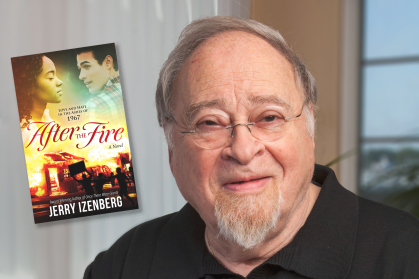Notes of Newark’s Native Son
Revered sports columnist and alumnus Jerry Izenberg has written his first novel, addressing a theme animating his work for decades: racial injustice.

When it comes to sports, alumnus Jerry Izenberg has seen and written it all. During a career that began as editor of Rutgers University–Newark’s student newspaper, The Observer, the 90-year-old scribe has covered 54 Kentucky Derbys, 53 Super Bowls, and sports events on every continent except Antarctica.
His nationally syndicated newspaper column, for years a prominent feature of The Star-Ledger of Newark, typically sought to reveal the person inside the player, writing in a forthright style that characterizes his first novel, After the Fire: Love and Hate in the Ashes of 1967 (Admission Press, 2020). The story, set outside athletics, draws on Izenberg’s perspective on the racial division that cleaved the City of Newark in the late 1960s and still afflicts America.
“Writing a novel before I croak was at the top of my bucket list,” says Izenberg NCAS’52, the author of 13 nonfiction books. “The story has four plots and begins five months after the riots. The big theme is a love affair between two college kids, a Black girl and an Italian boy living in the affected wards, and what they go through. Their parents, their environment—everything is against them and they have to persevere.”
The discrimination that biracial couples encounter is familiar to Izenberg, who is Jewish, and his wife, Aileen, a retired Newark school system administrator, who is African American. Married for 42 years, they have four children, nine grandchildren, and one great-grandchild. “I had to use fiction to get this story out,” says Izenberg, a 1991 inductee of the Rutgers Hall of Distinguished Alumni. “It’s part of the city, it’s part of the state, and it’s part of America. With what is happening right now, this story has swung back into focus.”
Among his peers, Izenberg remains the wise old man of sports journalism, for which he has received countless honors. These days, he freely shares his observations from his residence in Henderson, Nevada. A veteran of the Korean War who initially was a reporter for the New York Herald Tribune, he is often asked to look back at events and assess them in the context of today’s sports landscape, filled with calls for racial justice. “What’s happening is unprecedented,” says Izenberg, referring to the Black Lives Matter movement in professional sports. “There is much more awareness. With the 24-hour news cycle, the internet, and cable, African American athletes today are getting their message across.”
That message of protest led to the temporary disruption of the NBA playoffs in late August, a strike that was supported by all of the major professional sports in acknowledgment of the systemic racism in the United States. “I’m gratified that the (Milwaukee) Brewers joined the NBA’s response,” says Izenberg. “Major League Baseball’s record has not been very good because of the team owners, with some exceptions. When Martin Luther King Jr. was assassinated in 1968, only one team made the decision not to play. The commissioner left it up to the owners. That wouldn’t happen today. We haven’t moved far enough, but I think the athletes will wake people up. I really do.”
One athlete about whom Izenberg wrote extensively and with whom he formed a bond was world heavyweight champion boxer Muhammad Ali, the most vocal athlete in American history on matters of racial injustice. Being woke to the plight of minority athletes is the essence of Izenberg’s legacy and more reflects his character than his membership in 16 halls of fame or 15 Pulitzer Prize nominations. For more than 30 years, he was the guiding spirit of Project Pride, serving as president of the volunteer athletic and academic foundation that has provided college scholarships and enrichment programs to Newark youth. Larry Doby, the first African American to play in MLB’s American League, served on its board. Izenberg gave the eulogy at his funeral.
In 1963, Izenberg was the first white journalist to visit Grambling State University in Louisiana, and he is often credited with introducing white America to Black college football. His article “A Whistle-Stop School With Big-Time Talent,” declined by The Saturday Evening Post but published by True magazine, pointed out that the small, rural school had more players on NFL rosters than UCLA, Texas, or Alabama. “I’m an honorary alumnus,” says Izenberg. “I kept going back every year.” He went back in 1968, assisted by friend and sportscaster Howard Cosell, to produce a documentary on the Grambling Tigers and head coach Eddie Robinson, Grambling: 100 Yards to Glory, one of 35 network television documentaries that Izenberg wrote, produced, or narrated—often all three.
Izenberg’s on-site event coverage is now limited because of the challenges of travel and the COVID-19 crisis, but he has perspective. “We had a pandemic after the Spanish flu,” he says, “but everyone forgets; it was called polio.” His writing, however, remains formidable, his experience invaluable, and his outlook unwavering.
“The war-time years were also strange, particularly in baseball,” he says. “Almost everybody served. Ted Williams went twice. I remember a one-eyed shortstop, a one-armed outfielder, and a one-legged pitcher playing in the major leagues. That’s what the war did, but America accommodated itself. It spoke to our resiliency.”
That resiliency keeps Izenberg looking forward, not backward, despite the frequent requests for his recollections of the past. And the creative urge still beckons. “I have three or four more books that I want to do, and I’m in the middle of another one called Growing Up Jewish in Newark, New Jersey,” says Izenberg. “It’s the funniest thing I ever wrote.”